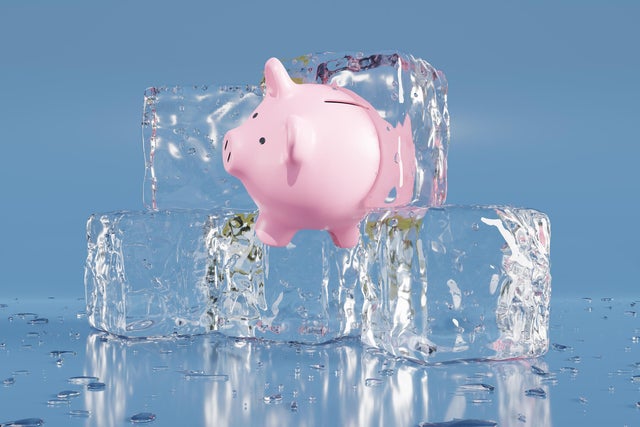5 moves to make if your bank account is frozen by a debt collector
Picture this: You log into your banking app expecting to pay bills, only to discover that you can't access your hard-earned funds. You check again, certain there's been some technical glitch, only to see a balance of zero dollars in an account that had money just yesterday. While your first thought might be fraud, the reality could be something entirely different — and potentially more complicated.
Bank account freezes are an aggressive but common tool in debt collectors' arsenals. And, unlike many other collection tactics, account freezes can happen with what feels like little to no warning while cutting off access to funds you need. What makes this particularly jarring is that some people discover they've been sued for an unpaid debt only when their money is no longer accessible.
While losing access to the money in your account feels catastrophic, especially when bills are due and paychecks are pending, the upside is that you're far from helpless in this situation. The difference between a temporary setback and a prolonged crisis, though, can come down to knowing what steps to take in those crucial first few days.
Find out how you can start tackling your expensive debt problems now.
5 moves to make if your bank account is frozen by a debt collector
When your account is frozen, the faster you respond, the better your chances of minimizing the financial disruption to your life. Here's exactly what you need to do to protect yourself and potentially get your money back:
Confirm the freeze and gather information
Your first move should be calling your bank immediately to confirm the freeze and get details about the court order or judgment that caused it. Banks are required to provide information to you about why your account was frozen, including the name of the creditor, the court that issued the order and the amount being claimed. During this call, ask for copies of all relevant documents and take detailed notes about your conversation, including the date, time and the name of the bank representative you spoke with.
And, don't assume the freeze is legitimate just because it happened. Mistakes occur frequently in debt collection, from cases of mistaken identity to expired statutes of limitations. Getting the facts straight from the start will help you determine whether you have grounds to challenge the action.
Explore your debt relief options and find the right solution today.
Review the judgment and consider challenging it
Once you have the documents, examine them carefully to understand the basis for the judgment. If you never received proper notice of the lawsuit, if the debt isn't yours or if the amount claimed is incorrect, you may be able to challenge the judgment itself. Many people have successfully overturned judgments by proving they weren't properly served with court papers.
But you should still check whether the debt collector followed proper procedures for freezing your account, even if the judgment appears valid. Some states require additional notice before funds can be seized, and creditors must leave certain exempt funds, like Social Security benefits, unemployment compensation and other protected income, untouched.
Identify and claim exempt funds
Federal and state laws protect certain types of income from being seized by debt collectors. If your frozen account contains Social Security payments, disability benefits, veterans' benefits, unemployment compensation or other exempt funds, you can file a claim to have those funds released immediately.
This process varies by state, but typically involves filing paperwork with the court that issued the judgment. Some banks will release any obviously exempt funds without a court order if you can provide proper documentation. Be sure to act quickly here, though. The longer exempt funds remain frozen, the more financial hardship you'll experience.
Negotiate with the debt collector directly
While legal challenges are proceeding, consider reaching out to the debt collector to negotiate a resolution. Many debt collectors are willing to release frozen funds in exchange for a payment arrangement or a settlement agreement. This approach can be faster than waiting for court proceedings and may result in paying less than the full judgment amount.
If your negotiations are successful, be sure to get any agreement in writing before making payments. Legitimate businesses will provide written agreements that outline payment terms and information on what happens to your frozen account once you comply.
Use debt relief to eliminate your balance quickly
If you're dealing with multiple debts or a judgment that's beyond your ability to pay, pursuing professional help via a debt relief company might be your fastest path to freedom. For example, debt relief companies can often help negotiate a significant reduction in what you owe, sometimes cutting balances by 30% to 50% or more. While this approach does come with extra costs, it can be more practical than dealing with the alternative.
Or, if your financial situation is severe enough, filing for bankruptcy might provide immediate protection through an automatic stay that stops all collection activities, including account freezes. A bankruptcy attorney can help you understand whether Chapter 7 or Chapter 13 bankruptcy makes sense for your situation.
The bottom line
Having your bank account frozen is scary, but it's not a permanent issue. Debt collectors have significant power, but that power isn't unlimited. You have rights that protect you, and there are clear steps you can take to resolve the issue. By understanding your legal rights, communicating with both your bank and the debt collector and considering debt relief options, you can put yourself on a path to regaining control of your finances.
